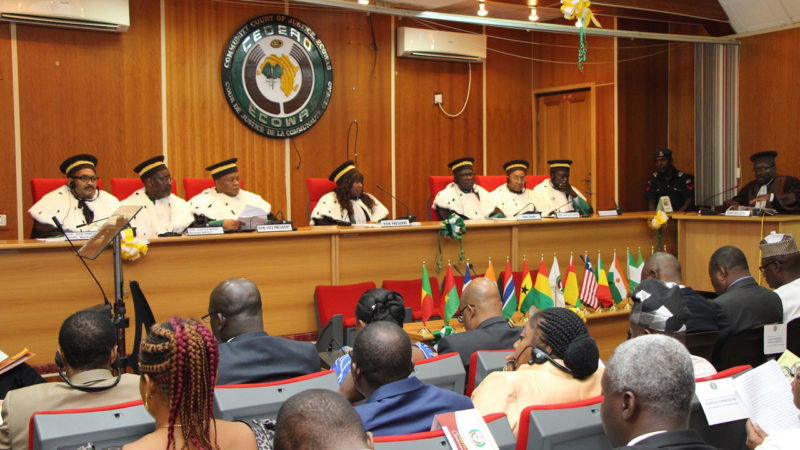It qualifies to be called a landmark judgment. That is the February 26th, 2019 judgment by the Economic Community of West African States (ECOWAS)’s Court of Justice which held the Nigerian federal government to be culpable of human rights violations by its failure to shield the Agatu and several other communities in Benue State from vulnerability to attacks by groups popularly called Fulani herdsmen during the series of attacks in 2016. At stake against the government is violation of its “obligation to protect the human rights of the Agatu Community and prevent its violation”.
Led by Solomon Mfa, a Catholic priest, the plaintiffs had sued the Federal Government with the president of Nigeria, the Inspector General of Police, the Chief of Army Staff and the Minister of Internal Affairs becoming the 1st, 2nd, 3rd and 4th defendants respectively. Among the plaintiffs in the Suit No: ECW/CCJ/APP/11/16 are Dr. David Iordaah, Dr. Sam Abah, Hon. Ochepo Yakubu, Hon. Terse Tange, Favour Adah Paul, Samuel Msonter Ijoho, Reverend Joseph Dooga, Iorbee Bajah, Ashi Bajah, Terseer Iorbee Bajah. The Movement Against Fulani Occupation (MAFO) completes the list.
It demanded a N500b compensation for over 50 major attacks on Benue communities in 15 out of 23 local government areas (LGAs) of the state viz Agatu, Buruku, Gwer East, Gwer West, Guma, Katsina Ala, Kwande, Konshisha , Logo, Makurdi, Obi, Oju, Tarka and Ukum for over three years by Fulani herdsmen.
Anchored on its view that no proofs were needed since no parties in the case denied mass killings, the Court hangs on the Federal Government the obligation to have adopted whatever means to guarantee those rights as equally enshrined in Article 1 of the African Charter on Human and Peoples’ Right. Nigeria is, of course, a signatory to the African Charter.

Chief of Army Staff, Gen Tukur Buratai, 2nd defendant in the case
Beyond failing in its law and order duty, said the court, the government also failed in providing fallback for those affected and it did not even try to establish what happened, much less bringing the offenders to justice. Above all, the court rejected the Federal Government’s conception of the violence as communal conflict involving herdsmen and farmers, categorically declaring in favour of the position of the plaintiff’s that Fulani herdsmen were the attackers.
It rejected few other grounds advanced by the government, one of which is the contention that the plaintiffs could not bring the action in a representative capacity. To the contrary, the Court held that the situation warranted it to “allow NGO’s and public-spirited individuals to institute actions on behalf of group of victims usually from a community or class of people based on common public interest to claim for the violation of their human rights, because this group may not have the knowledge and the financial capacity to maintain legal action of such magnitude which affects the general public interest”.
In all, these are weighty pronouncements. But what does it all amount to, for the Nigerian government, for the victims of the herdsmen violence in Agatu in 2016 and for citizenship in Nigeria. Interested parties find these question important particularly that the Court did not go ahead to award any compensation, contrary to the grain that every judgment contains remedies. Why didn’t this follow that precept? The reason the Court itself gave is that the plaintiffs did not avail it of the specific details of the victims such as the names, addresses, the age and the gender or the value of the properties that had been destroyed.
Intervention asked around and came up with this synthesis, mainly the view of lawyers, very senior lawyers and sufficiently detached in their lens on the judgment. Broadly, three implications were outlined.
The first starts from the premise that the ECOWAS Court is a regional court. The judgment in this case is categorised as a declarative one. The key point there is that it is assumed that the state part(ies) only need the judgment to be explained to them and for them to comply. That is, Nigeria having obligated itself to act in conformity and compliance with the court would review its behavior accordingly and be guided by the ruling. Whether this assumption holds in practice is a different matter but that is the normative catch there. Declarative judgments do not lack but doesn’t quite have effective enforcement mechanism.
However, this does not mean the Nigerian government has all the rooms for manoeuver. For, the judgment could be interpreted to mean an indictment of the Federal Government as condoning genocide. The broader implication is thus that it exposes the Federal Government of Nigeria to actions by other stakeholders of international security, such as the prosecutor of the international criminal court who could, using the opinion of the ECOWAS Court, take on the Federal Government. In such instance, the prosecutor would need no more than the inference that a state actor is found to be deficient in massive loss of lives.
That leads to a third plank to what the judgment means. And that is the diplomatic implication – other state actors beginning to judge Nigeria on the basis of the opinion of the Court as the Other of the norm.
What all these amount to is that not only the plaintiff in this case but other categories of citizenship and other communities have been issued an additional instrument by which they can constrain or benchmark the normative practices of the Nigerian State. It provides one more evidence of the gradual withering of the state in a globalized world. Of course, more politics is needed to make such judgments to count. It nevertheless remains a viable addition.




























